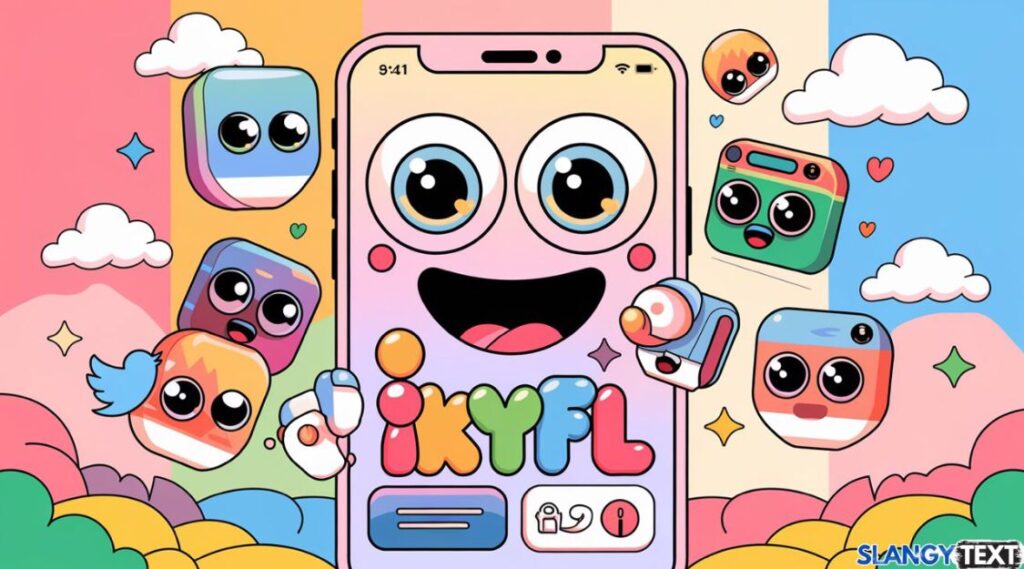In the fast-paced world of digital communication, abbreviations have become a cornerstone of our online interactions. One such abbreviation that’s gained traction is IKYFL.
This bold abbreviation has become a digital detector for deceit, often used when someone suspects dishonesty in a conversation.
Decoding IKYFL
IKYFL stands for “I Know You’re F#cking Lying.” It’s an unfiltered response that cuts through the noise of digital communication. When someone uses IKYFL, they’re expressing skepticism and disbelief in no uncertain terms.
In a text conversation, you might see something like this:
“Hey Sarah, I can’t make it to your party. My car broke down.”
“IKYFL. I just saw you driving an hour ago.”
This blunt honesty can catch people off guard, especially those used to more polite digital interactions. But in a world where lying can be easier behind a screen, IKYFL serves as a tool for emotional honesty.
From Text to Trend
The popularity of IKYFL has surged across various platforms. From texting to TikTok, Snapchat to Twitter, this abbreviation pops up in social media posts with increasing frequency.
Platform-Specific Usage
| Platform | Example Usage | Context |
|---|---|---|
| @JohnDoe: “Traffic made me late” @JaneSmith: “IKYFL, I saw your Instagram story at the coffee shop” | Calling out a friend’s excuse | |
| TikTok | User lip-syncs to audio: “IKYFL when you said you were busy” | Reacting to being stood up |
| Snapchat | Snapchat story caption: “When your ex says they’re over you but keep watching your stories #IKYFL” | Expressing doubt about an ex’s claims |
| Comment on a post: “I took this photo without any filters!” Reply: “IKYFL, I can see the Facetune” | Questioning the authenticity of a photo | |
| Status: “Can’t hang out, I’m sick” Comment: “IKYFL, I just saw you at the mall” | Catching someone in a lie about their plans | |
| “Sorry, I didn’t see your message” Reply: “IKYFL, you were online 5 minutes ago” | Calling out someone for ignoring messages | |
| “I’m a self-made entrepreneur” Comment: “IKYFL, we all know your dad funded your startup” | Challenging someone’s professional claims | |
| YouTube | Comment on a prank video: “This is 100% real!” Reply: “IKYFL, it’s clearly staged” | Expressing disbelief about video authenticity |
| Post: “I solved this math problem in seconds!” Comment: “IKYFL, that’s impossible without a calculator” | Doubting someone’s claimed abilities | |
| Discord | “I’m a pro gamer, I never lose” Reply: “IKYFL, I’ve beaten you 10 times today” | Calling out exaggerated gaming skills |
This trend reflects a shift towards more direct communication in online spaces. People are becoming more assertive and straightforward in their digital interactions, using abbreviations like IKYFL to cut through potential deceit.
You might also like : What Does IDM Mean?
The Psychology of Directness
When someone drops an IKYFL in a conversation, it’s more than just an abbreviation. It’s a statement that carries weight. It’s saying, “I don’t believe you, and I’m not afraid to call you out on it.”
This kind of blunt honesty can be jarring, especially in a digital world where we often curate our responses. But it also serves a purpose. It’s a way of challenging dishonesty and promoting more authentic communication.
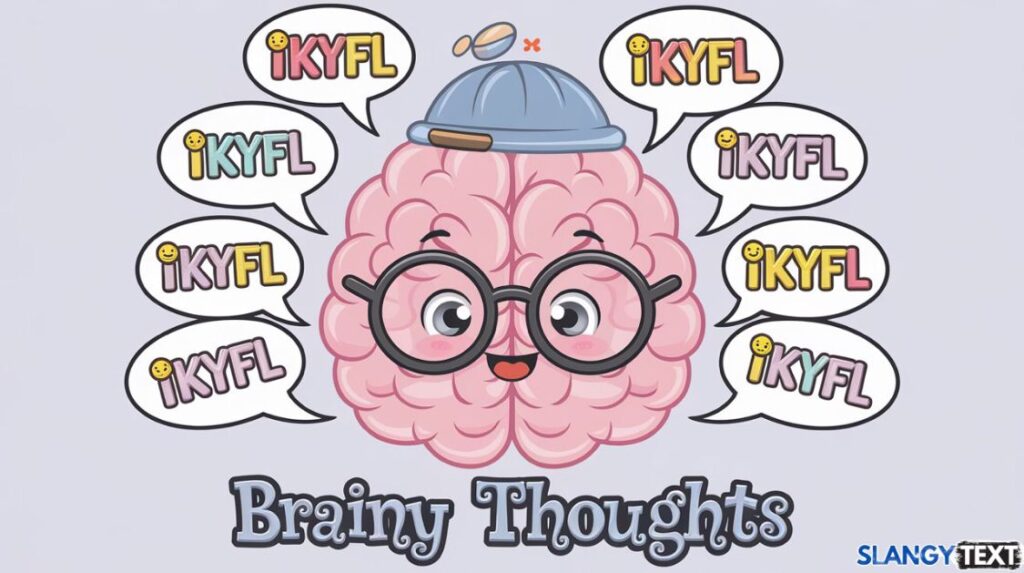
Navigating Online Relationships
| Scenario | Without IKYFL | With IKYFL |
|---|---|---|
| Mike cancels plans last minute | Sarah: “Oh, okay. Maybe next time.” | Sarah: “IKYFL. You always do this.” |
| Emma claims she’s too busy to help | John: “I understand. No worries.” | John: “IKYFL. You were gaming all day.” |
| Tom says he’s working late | Lisa: “Alright, don’t work too hard.” | Lisa: “IKYFL. I saw you at the bar.” |
| Alex says he’s not upset | Rachel: “If you say so…” | Rachel: “IKYFL. You’re clearly angry.” |
| Olivia says she forgot about the meeting | David: “It happens. We’ll catch you up.” | David: “IKYFL. You were reminded this morning.” |
| Jake claims he didn’t eat the last cookie | Mia: “Hmm, I wonder who did then.” | Mia: “IKYFL. There are crumbs on your shirt.” |
| Sophia says she’s not interested in dating | Chris: “Okay, I respect that.” | Chris: “IKYFL. You were just on Tinder.” |
| Nathan says he’s been studying all day | Emily: “That’s great! Keep it up.” | Emily: “IKYFL. Your Xbox has been online.” |
| Liam claims he’s a vegan | Ava: “Oh, that’s cool.” | Ava: “IKYFL. I saw you eating a burger yesterday.” |
| Zoe says she’s never gossiped about anyone | Ethan: “That’s admirable.” | Ethan: “IKYFL. I’ve heard you talking about others.” |
Using IKYFL can be a way of demanding honesty and accountability in our digital relationships. It’s a tool for cutting through excuses and getting to the truth of a situation.
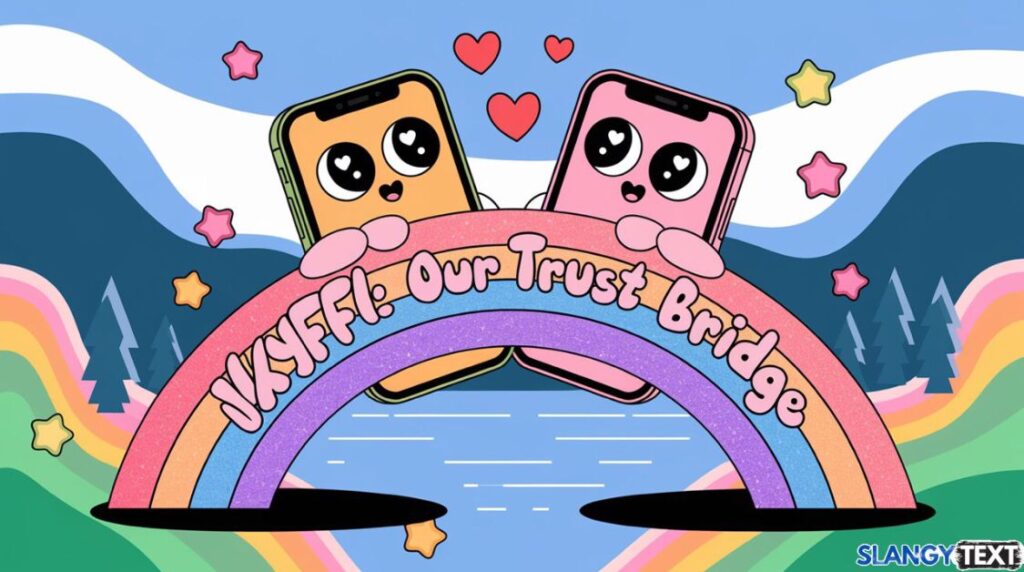
The Cultural Impact of IKYFL
The rise of IKYFL is part of a broader trend in digital communication. It reflects a shift towards more unfiltered expression and direct communication in our online interactions.
IKYFL and Modern Slang
IKYFL is just one example of how language evolves in the digital age. It’s part of a larger vocabulary of abbreviations and slang terms that shape our online conversations.
This trend towards more direct, sometimes confrontational language online has its pros and cons. On one hand, it can lead to more honest, authentic communication. On the other, it can sometimes come across as harsh or accusatory.
The Language of Honesty
The use of IKYFL isn’t limited to casual conversations among friends. It’s found its way into various aspects of digital life, from work communications to online dating.
IKYFL in Professional Settings
While IKYFL might seem too informal for professional contexts, it’s not uncommon to see it used in more casual work environments, especially among younger professionals.
| Scenario | Professional Use of IKYFL | Potential Outcome |
|---|---|---|
| Mark claims he sent an important email | Jenna: “IKYFL. It’s not in my inbox or spam.” | Mark double-checks and resends the email |
| Laura says she finished the project | Ryan: “IKYFL. The client hasn’t received anything.” | Laura realizes she forgot to hit send |
| Daniel insists he was on time for the meeting | Ashley: “IKYFL. We all saw you sneak in late.” | Daniel apologizes for his tardiness |
| Sophia claims she didn’t get the memo | Michael: “IKYFL. I saw you read the group email.” | Sophia admits she forgot about it |
| James says he’s been working on the report all day | Emma: “IKYFL. Your computer’s been idle for hours.” | James confesses he got distracted |
| Alex insists he submitted the expense report | Sarah: “IKYFL. Finance hasn’t received anything.” | Alex realizes he forgot to submit it |
| Olivia claims she didn’t miss any deadlines | David: “IKYFL. We’re three milestones behind.” | Olivia acknowledges her oversight |
| Nathan says he’s been in back-to-back meetings | Emily: “IKYFL. Your calendar’s been clear all day.” | Nathan admits he needed a mental health day |
| Liam insists he followed the new protocol | Ava: “IKYFL. The data shows otherwise.” | Liam agrees to review the protocol again |
| Zoe claims she’s been responding to all client emails | Ethan: “IKYFL. We’ve had three complaints about unanswered messages.” | Zoe realizes she needs to improve her response time |
While using IKYFL in a professional setting can be risky, it can also foster a culture of accountability and honesty when used appropriately.
The Future of IKYFL
As digital communication continues to evolve, abbreviations like IKYFL will likely continue to play a role in how we express ourselves online. They’re part of a larger trend towards more direct, unfiltered communication in digital spaces.
IKYFL and Digital Honesty
The popularity of IKYFL speaks to a desire for more authentic interactions online. In a world where it’s easy to present a curated version of ourselves, IKYFL serves as a tool for cutting through the noise and demanding honesty.
| Scenario | Traditional Response | IKYFL Response |
|---|---|---|
| Tom claims he’s been busy | “Oh, I understand.” | “IKYFL. You’ve been posting on Instagram all week.” |
| Emma says she’s not dating anyone | “Okay, cool.” | “IKYFL. I saw you on a date last night.” |
| Mike insists he’s been eating healthy | “That’s great!” | “IKYFL. Your Uber Eats history says otherwise.” |
| Sarah claims she’s been studying | “Good for you!” | “IKYFL. Your Netflix account has been active 24/7.” |
| Jake says he’s been saving money | “That’s responsible of you.” | “IKYFL. You just bought a new gaming system.” |
| Olivia insists she’s over her ex | “I’m glad to hear that.” | “IKYFL. You still have their pictures all over your room.” |
| Alex claims he’s been working out regularly | “Keep it up!” | “IKYFL. Your fitness app shows no activity for months.” |
| Sophia says she’s been reading more | “That’s wonderful.” | “IKYFL. Your Goodreads account is gathering dust.” |
| Liam insists he’s been practicing guitar daily | “You’ll be a pro in no time!” | “IKYFL. Your guitar is still in its case from last year.” |
| Zoe claims she’s been cooking at home more | “That’s a great habit!” | “IKYFL. Your food delivery app is blowing up my phone.” |
The Ethics of Using IKYFL
While IKYFL can be a powerful tool for promoting honesty, it’s important to consider the ethics of its use. Is it always appropriate to call someone out so directly? How do we balance the desire for honesty with the need for tact and kindness in our interactions?
IKYFL and Emotional Intelligence
Using IKYFL effectively requires a high degree of emotional intelligence. It’s not just about catching someone in a lie; it’s about fostering better communication and understanding.
| Scenario | Low EQ Use of IKYFL | High EQ Use of IKYFL |
|---|---|---|
| Friend cancels plans | “IKYFL. You’re just lazy.” | “IKYFL. Is something else going on?” |
| Coworker misses deadline | “IKYFL. You’re so irresponsible.” | “IKYFL. Do you need help managing your workload?” |
| Partner says they’re fine | “IKYFL. You’re clearly upset.” | “IKYFL. I’m here if you want to talk about it.” |
| Sibling claims they didn’t take your stuff | “IKYFL. You’re such a thief.” | “IKYFL. Can we talk about respecting each other’s belongings?” |
| Friend says they’re not drinking | “IKYFL. You’re such a liar.” | “IKYFL. I’m concerned about your drinking habits.” |
| Classmate says they studied | “IKYFL. You’re just ……..” | “IKYFL. Would you like to study together next time?” |
| Neighbor claims they didn’t make noise | “IKYFL. You’re so inconsiderate.” | “IKYFL. Can we discuss quiet hours?” |
| Child says they brushed their teeth | “IKYFL. You never listen.” | “IKYFL. Let’s talk about the importance of dental hygiene.” |
| Friend says they’re not upset about a breakup | “IKYFL. You’re clearly a mess.” | “IKYFL. It’s okay to not be okay. I’m here for you.” |
| Coworker claims they contributed to a project | “IKYFL. You did nothing.” | “IKYFL. Can we review our individual contributions?” |
Using IKYFL with emotional intelligence can turn potentially confrontational situations into opportunities for growth and better understanding.
IKYFL and Generational Differences
The use of abbreviations like IKYFL often highlights generational differences in communication styles. Younger generations, who’ve grown up with digital communication, may be more comfortable with this direct, abbreviated language.
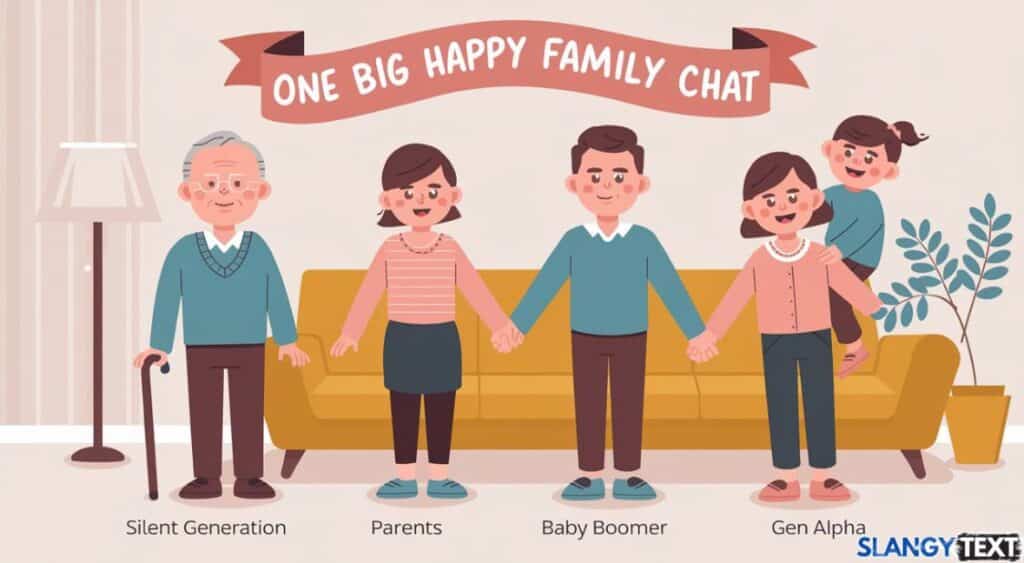
IKYFL Across Generations
Understanding how different generations perceive and use IKYFL can help bridge communication gaps and foster better understanding across age groups.
| Generation | Typical View of IKYFL | Common Use of IKYFL |
|---|---|---|
| Gen Z | Casual, everyday language | “IKYFL. That TikTok trend is so last week.” |
| Millennials | Useful for calling out dishonesty | “IKYFL. Your Instagram life doesn’t match reality.” |
| Gen X | Potentially too blunt, but useful | “IKYFL. You can’t ghost a work meeting.” |
| Baby Boomers | Often seen as disrespectful | “I know you’re not being truthful” (avoids abbreviation) |
| Silent Generation | Rarely used or understood | Unlikely to use or encounter IKYFL |
| Gen Alpha | Growing up with it as normal language | “IKYFL. That AI generated your homework.” |
| Xennials | Comfortable with it in casual settings | “IKYFL. Your away message doesn’t fool anyone.” |
| Zillennials | Use it fluidly in various contexts | “IKYFL. Your Finsta tells a different story.” |
| Gen Jones | May use it, but less frequently | “I find that hard to believe” (softer version) |
| Oregon Trail Generation | Adapts usage based on audience | “IKYFL” in texts, “I’m skeptical” in person |
Understanding these generational differences can help us navigate the use of IKYFL and similar language across different age groups and contexts.
The Global Reach of IKYFL
While IKYFL originated in English-speaking online communities, its use has spread globally. In our interconnected world, slang and abbreviations often transcend language barriers.
You might also like to know this : what Does ICL Mean?
IKYFL in Different Languages
The concept behind IKYFL – calling out perceived dishonesty – exists in many cultures. However, the specific abbreviation might be used differently or have equivalents in other languages.
| Language | IKYFL Equivalent | Literal Translation |
|---|---|---|
| Spanish | “SQEM” | “Sé Que Estás Mintiendo” |
| French | “JSQTM” | “Je Sais Que Tu Mens” |
| German | “IWDL” | “Ich Weiß Du Lügst” |
| Italian | “SCSMF” | “So Che Stai Mentendo, Fra” |
| Portuguese | “ESQVM” | “Eu Sei Que Você Mente” |
| Russian | “ЯЗЧТВ” | “Я Знаю Что Ты Врешь” |
| Japanese | “USO” | “嘘” (meaning “lie”) |
| Korean | “GNSJAL” | “거짓말 하는 줄 알아” |
| Chinese | “NZPH” | “你在撒谎” |
| Hindi | “MJTKJR” | “Mujhe Tum Ko Jhooth Bol Rahe” |
While these equivalents exist, it’s worth noting that the use of such abbreviations can vary widely based on cultural norms and communication styles.
The Impact of IKYFL on Relationships
The use of IKYFL in personal relationships can be a double-edged sword. On one hand, it promotes honesty and directness. On the other, it can come across as accusatory and potentially damage trust if used too frequently or in the wrong context.
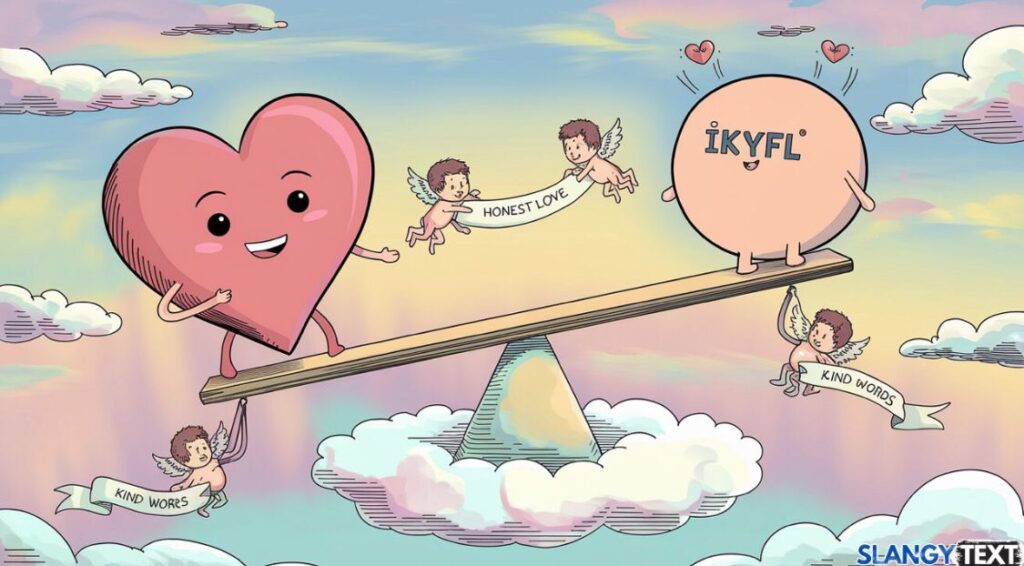
IKYFL in Different Types of Relationships
Understanding when and how to use IKYFL in different relationships is crucial for maintaining healthy communication.
| Relationship Type | Appropriate Use of IKYFL | Inappropriate Use of IKYFL |
|---|---|---|
| Romantic Partners | “IKYFL about being okay with me going out. Let’s talk about it.” | “IKYFL. You’re probably cheating on me.” |
| Close Friends | “IKYFL about not caring about the party. What’s really going on?” | “IKYFL. You’re such a fake friend.” |
| Family Members | “IKYFL about doing your chores. Can we make a plan together?” | “IKYFL. You never do anything around here.” |
| Coworkers | “IKYFL about the project being done. Can we review it together?” | “IKYFL. You’re so lazy and incompetent.” |
| Acquaintances | Generally not appropriate | “IKYFL. I barely know you and I can tell you’re lying.” |
| Online Strangers | Not recommended | “IKYFL. You’re just a troll.” |
| Teachers/Students | Not appropriate in most cases | “IKYFL about doing your homework. You’re a terrible student.” |
| Bosses/Employees | Rarely appropriate, if ever | “IKYFL about that promotion. You’re playing favorites.” |
| Neighbors | Use with caution | “IKYFL about not having loud parties. I hear them every weekend.” |
| Service Providers | Not recommended | “IKYFL about the package being delivered. I’ve been home all day.” |
The key is to use IKYFL as a tool for opening up honest communication, not as a weapon to attack or accuse others.
IKYFL and Mental Health
The use of IKYFL and similar direct language in digital communication can have significant impacts on mental health. For some, it can be empowering to call out perceived dishonesty. For others, it might increase anxiety about being caught in even small white lies.
Navigating IKYFL and Emotional Well-being
It’s important to consider the emotional impact of using such direct language, both on ourselves and others.
| Scenario | Potential Positive Impact | Potential Negative Impact |
|---|---|---|
| Using IKYFL with a friend | Promotes honesty in friendship | May cause defensiveness or hurt feelings |
| Receiving an IKYFL | Encourages self-reflection | Might trigger feelings of shame or anxiety |
| Witnessing IKYFL in a group chat | Can discourage dishonesty in the group | Might create a tense or uncomfortable atmosphere |
| Using IKYFL in a work context | Can promote accountability | Might damage professional relationships |
| IKYFL in a family disagreement | Can bring hidden issues to light | Could escalate conflict if used aggressively |
| IKYFL in a romantic relationship | Might encourage open communication | Could erode trust if overused |
| Using IKYFL on social media | Can call out misinformation | Might lead to public embarrassment |
| IKYFL in response to a sensitive topic | Could encourage honesty about difficult subjects | Might shut down communication if the person isn’t ready to be honest |
| Frequent use of IKYFL | May create a culture of honesty | Could lead to constant suspicion and mistrust |
| IKYFL in response to a white lie | Might discourage even small dishonesty | Could make social interactions overly tense |
The key is to use IKYFL mindfully, considering the context and the potential impact on both the sender and the receiver.
Conclusion: The Future of Digital Communication
As we navigate the complex landscape of digital communication, abbreviations like IKYFL play a significant role in shaping how we interact online. They reflect our desire for authenticity and directness in a digital world where it’s easy to hide behind screens.
However, as with any tool, the power of IKYFL lies in how we use it. When used thoughtfully, it can promote honesty and open communication. When misused, it can damage relationships and create unnecessary conflict.
As digital communication continues to evolve, we’ll likely see more abbreviations and slang terms emerge, each carrying its own weight and implications. The key will be to use these tools of language wisely, always considering the impact of our words on others.
In the end, whether we’re using IKYFL or any other form of communication, the goal should be to foster understanding, promote honesty, and build stronger connections with those around us. As we continue to navigate the digital age, let’s strive to use our words – abbreviated or not – to create a more authentic and compassionate online world.

Kayla Rogers is a writer at Slangy Text who loves exploring modern acronyms & slangs and how they shapes our conversations. She enjoys sharing fun and interesting articles that connect with readers. When she’s not writing, Kayla likes to keep up with the latest trends or relax with a good book.

